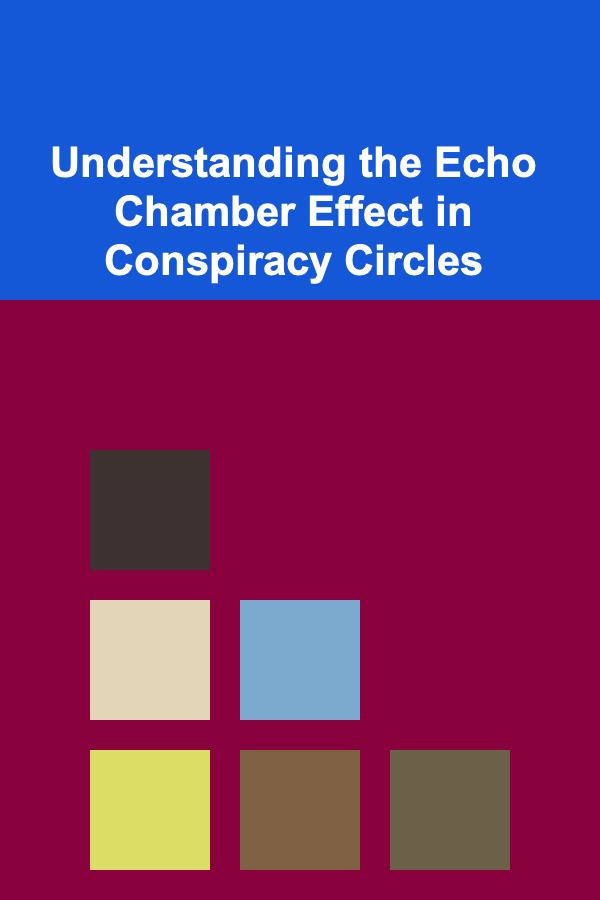
Understanding the Echo Chamber Effect in Conspiracy Circles
ebook include PDF & Audio bundle (Micro Guide)
$12.99$11.99
Limited Time Offer! Order within the next:

Conspiracy theories, often dismissed as fringe beliefs, hold significant sway over a considerable segment of the population. Understanding why these theories persist and proliferate requires delving into the complex psychological and sociological mechanisms at play. A particularly potent force driving the acceptance and spread of conspiracy theories is the echo chamber effect. This essay will explore the echo chamber effect within conspiracy circles, examining its causes, consequences, and potential strategies for mitigation. It will explore the psychological underpinnings, the role of algorithms and social media, the impact on social cohesion, and ultimately, offer potential approaches for navigating these treacherous informational landscapes.
What is the Echo Chamber Effect?
At its core, the echo chamber effect describes a situation where individuals are primarily exposed to information and perspectives that confirm their existing beliefs. This happens when people selectively consume media, interact with like-minded individuals, and filter out dissenting viewpoints. The result is a reinforced and often amplified conviction in the validity of one's pre-existing beliefs, irrespective of their factual accuracy. In essence, it's a self-reinforcing cycle where opinions are echoed back and forth, creating an illusion of widespread consensus and reinforcing individual convictions.
The concept of the echo chamber is closely related to several other psychological and sociological phenomena, including:
- Confirmation Bias: The tendency to seek out, interpret, favor, and recall information that confirms one's pre-existing beliefs or hypotheses.
- Selective Exposure: The act of selectively exposing oneself to media and information that align with one's own viewpoints, while avoiding contradictory information.
- Group Polarization: The tendency for groups to make decisions that are more extreme than the initial inclination of its members.
- Cognitive Dissonance: The mental discomfort experienced when holding conflicting beliefs or values, which individuals may seek to reduce by altering one or more of their beliefs.
These concepts are intertwined and contribute to the formation and perpetuation of echo chambers. Individuals with pre-existing biases are more likely to seek out confirming information (selective exposure), which then reinforces those biases (confirmation bias). Within a group setting, this process can lead to group polarization, where the group's initial bias is amplified, further solidifying beliefs and dismissing dissenting perspectives.
The Psychology of Conspiracy Beliefs
Understanding why individuals are drawn to conspiracy theories is crucial for grasping the echo chamber effect. Several psychological factors contribute to the appeal of these often unsubstantiated claims:
- Need for Understanding and Control: Conspiracy theories often offer simple, seemingly logical explanations for complex and unsettling events. They can provide a sense of order and control in a chaotic world, allowing individuals to feel like they understand the hidden forces shaping their lives.
- Distrust of Authority: A general distrust of government, media, and other institutions can make individuals more receptive to conspiracy theories that challenge the official narrative. This distrust can stem from personal experiences, historical events, or a broader sense of alienation from mainstream society.
- Search for Meaning and Belonging: Conspiracy communities can provide a sense of belonging and shared purpose for individuals who feel isolated or marginalized. These communities offer a space where individuals can connect with like-minded people, share their beliefs, and feel validated in their views.
- Cognitive Biases: As mentioned earlier, confirmation bias plays a significant role in the acceptance of conspiracy theories. Individuals are more likely to accept evidence that supports their beliefs, even if it is weak or flawed, and dismiss evidence that contradicts them, even if it is strong and reliable. Other cognitive biases, such as the illusion of control and the availability heuristic, can also contribute to the appeal of conspiracy theories.
Furthermore, individuals who feel powerless or disenfranchised are often more susceptible to conspiracy thinking. These theories can provide a sense of empowerment by allowing individuals to feel like they possess special knowledge or are part of a select group who "know the truth." This feeling of empowerment, however illusory, can be highly addictive and reinforce the individual's commitment to the conspiracy theory.
The Role of Algorithms and Social Media
Social media platforms and search engines, while offering unprecedented access to information, have inadvertently contributed to the formation and amplification of echo chambers. Algorithms designed to personalize user experiences often prioritize content that aligns with their existing interests and preferences. This creates a filter bubble, where individuals are primarily exposed to information that confirms their beliefs, while dissenting viewpoints are filtered out.
Several factors contribute to this algorithmic amplification:
- Personalized Recommendations: Social media platforms and search engines use algorithms to recommend content based on a user's past behavior, including their search history, browsing activity, and social media interactions. If a user shows an interest in a particular conspiracy theory, the algorithm is likely to recommend more content related to that theory, further reinforcing their beliefs.
- Filter Bubbles: The personalization of content creates filter bubbles, where users are primarily exposed to information that aligns with their existing viewpoints. This can lead to a distorted perception of reality, where individuals overestimate the prevalence of their beliefs and underestimate the validity of opposing viewpoints.
- Viral Spread: Social media allows conspiracy theories to spread rapidly and widely. Sensational or emotionally charged content is often more likely to go viral, even if it is based on misinformation or unsubstantiated claims. The rapid spread of conspiracy theories can create a sense of urgency and legitimacy, making them more appealing to individuals who are seeking information or validation.
- Group Dynamics: Social media platforms facilitate the formation of online communities centered around shared beliefs. These communities can provide a space for individuals to connect with like-minded people, share their experiences, and reinforce their beliefs. Within these communities, dissenting viewpoints are often suppressed or ignored, further solidifying the group's consensus on the validity of the conspiracy theory.
The anonymity afforded by online platforms can also contribute to the spread of misinformation. Individuals may feel more comfortable sharing unsubstantiated claims or engaging in hostile behavior when they are not held accountable for their actions. This anonymity can create a breeding ground for conspiracy theories, where misinformation can flourish without fear of challenge or correction.
Consequences of Echo Chambers in Conspiracy Circles
The echo chamber effect within conspiracy circles can have several detrimental consequences, both for individuals and for society as a whole:
- Reinforcement of Misinformation: The constant exposure to unsubstantiated claims within an echo chamber can lead individuals to believe that these claims are true, regardless of the evidence to the contrary. This can result in the acceptance of misinformation and the rejection of factual information.
- Increased Polarization: Echo chambers can exacerbate political and social polarization by creating a sense of "us versus them." Individuals within the echo chamber may view those who hold opposing viewpoints as enemies or as being intentionally misinformed.
- Erosion of Trust: The spread of conspiracy theories can erode trust in government, media, and other institutions. This can lead to a decline in civic engagement and a weakening of social cohesion.
- Real-World Consequences: In some cases, conspiracy theories can have real-world consequences, such as the spread of vaccine hesitancy, the incitement of violence, or the disruption of democratic processes. For example, the QAnon conspiracy theory has been linked to several acts of violence, including the January 6th Capitol riot.
- Radicalization: The echo chamber effect can contribute to radicalization by exposing individuals to increasingly extreme viewpoints. As individuals become more immersed in a conspiracy community, they may be exposed to more radical ideas and be pressured to conform to the group's norms.
Furthermore, individuals trapped within echo chambers may become increasingly isolated from the outside world. Their relationships with family and friends who do not share their beliefs may become strained or broken. This isolation can further reinforce their reliance on the conspiracy community for support and validation, making it even more difficult to escape the echo chamber.
Breaking Free: Strategies for Mitigating the Echo Chamber Effect
Breaking free from the echo chamber effect requires a conscious effort to challenge one's own beliefs, seek out diverse perspectives, and critically evaluate information. While it's a difficult process, several strategies can be employed:
- Actively Seek Out Diverse Perspectives: Make a conscious effort to consume news and information from a variety of sources, including those that challenge your own beliefs. Read articles and listen to podcasts from different political perspectives. Follow people on social media who hold different opinions.
- Challenge Your Own Biases: Recognize that everyone has biases, and that these biases can influence how we interpret information. Be aware of your own biases and try to compensate for them by seeking out information that challenges your preconceptions.
- Critically Evaluate Information: Before accepting information as true, critically evaluate its source, its accuracy, and its potential biases. Look for evidence to support the claim, and be wary of claims that are based on speculation or conjecture. Use fact-checking websites to verify the accuracy of information.
- Engage in Civil Discourse: Engage in respectful conversations with people who hold different opinions. Listen to their perspectives and try to understand their reasoning. Avoid personal attacks and focus on the issues at hand.
- Promote Media Literacy: Educate yourself and others about media literacy, including how to identify fake news, how to evaluate sources, and how to recognize bias. This can empower individuals to become more critical consumers of information.
- Algorithm Awareness and Management: Understand how algorithms shape your online experience. Actively manage your social media feeds by unfollowing or muting accounts that reinforce echo chamber tendencies. Explore alternative search engines and platforms that prioritize diverse perspectives.
For individuals who know someone trapped in a conspiracy echo chamber, a different approach is needed. Direct confrontation is often counterproductive, as it can lead to defensiveness and entrenchment. Instead, focus on building trust and rapport. Ask open-ended questions that encourage critical thinking, and gently challenge their assumptions with factual information. Be patient and understanding, and remember that breaking free from an echo chamber is a process that takes time.
The Role of Platforms and Institutions
Social media platforms and institutions also have a responsibility to mitigate the echo chamber effect and promote a more informed and civil public discourse:
- Algorithm Transparency and Accountability: Social media platforms should be more transparent about how their algorithms work and how they can contribute to the formation of echo chambers. They should also be held accountable for the spread of misinformation on their platforms.
- Content Moderation: Social media platforms should have clear and consistent policies for content moderation, and they should enforce those policies effectively. This includes removing content that promotes violence, hate speech, and misinformation.
- Media Literacy Initiatives: Educational institutions and media organizations should invest in media literacy initiatives to help individuals develop the skills needed to critically evaluate information and navigate the complex information landscape.
- Support for Independent Journalism: Independent journalism plays a crucial role in holding power accountable and providing accurate information to the public. Supporting independent journalism can help to combat the spread of misinformation and promote a more informed public discourse.
- Promoting Critical Thinking in Education: Schools should emphasize critical thinking skills in their curriculum, teaching students how to evaluate evidence, identify biases, and form their own informed opinions. This will equip future generations with the tools needed to navigate the complex information landscape and resist the allure of conspiracy theories.
By working together, individuals, platforms, and institutions can help to break down echo chambers, promote a more informed public discourse, and strengthen the foundations of democracy.
Conclusion
The echo chamber effect is a powerful force that can contribute to the spread of misinformation, the erosion of trust, and the polarization of society. Understanding the psychological underpinnings, the role of algorithms, and the consequences of echo chambers is crucial for developing effective strategies for mitigation. By actively seeking out diverse perspectives, critically evaluating information, engaging in civil discourse, and promoting media literacy, we can break free from echo chambers and build a more informed, resilient, and cohesive society. Overcoming the challenge of echo chambers within conspiracy circles requires a multi-faceted approach, involving individual effort, platform responsibility, and institutional commitment. Only through sustained and collaborative action can we hope to navigate the treacherous informational landscape and safeguard the integrity of truth and reason.

How to Create an Outdoor Wellness Sanctuary
Read More
How to Keep Your Home's Windows in Top Condition
Read More
How to Successfully Renovate a Historic Home
Read More
Smart Strategies for Cutting Back on Unnecessary Subscriptions
Read More
How to Get Cheap Accommodation in Major Cities
Read More
How to Cook Perfect Rice Every Time
Read MoreOther Products

How to Create an Outdoor Wellness Sanctuary
Read More
How to Keep Your Home's Windows in Top Condition
Read More
How to Successfully Renovate a Historic Home
Read More
Smart Strategies for Cutting Back on Unnecessary Subscriptions
Read More
How to Get Cheap Accommodation in Major Cities
Read More